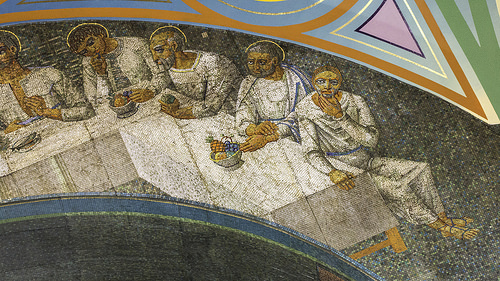We run our website the way we wished the whole internet worked: we provide high quality original content with no ads. We are funded solely by your direct support. Please consider supporting this project.

The Open View of Messianic Prophesies
Image by Lawrence OP via Flickr
A number of passages speak of particular events being foreknown by God, even events resulting from individuals’ free will. For example, dozens of prophesies in the OT accurately predict details about the coming Messiah (e.g., he would be born in Bethlehem; arise out of the lineage of Abraham; be executed with criminals; have his side pierced; be buried with the rich; atone for the sins of many). Most of these predictions seem to involve future free decisions of individuals.
How are the messianic prophesies possible unless God possesses exhaustive definite foreknowledge?
In point of fact, however, these passages present no difficulty for the view of the future which is partly open. While the open view holds that humans must be free to the extent that they are capable of love, this freedom obviously has limits. Indeed, the concept of freedom is only meaningful against a backdrop of limited determinism. Our freedom is conditioned (but not extinguished) by our genes, our environment, our previous choices and acquired character, and most certainly God’s will. The open view of the future thus affirms that many aspects of the future are determined either by God or by inevitable consequences of present causes. It is therefore compatible with the biblical portrait of God as the sovereign Lord of history who knows all settled aspects of the future ahead of time, and who is able to determine whatever he wants to ahead of time to accomplish his objectives. There is therefore no logical problem in reconciling the biblical truth that the Lord predestined and foreknew various details about the Messiah.
However, in Acts 2:23 and 4:28, God seems to predestine a wicked deed (crucifying Jesus) while at the same time holding the perpetrators responsible for it. Does this undermine the claim that morally responsible free acts cannot be part of the future that is settled? Two points.
First, neither of these passages suggest that the individuals who crucified Jesus were predestined and foreknown. These verses only affirm that it was preordained and foreknown that the Messiah would be crucified. That Jesus would be killed was predetermined. Who would do it was not. As long as God knew that in certain circumstances there would be a certain percentage of people who would act as the wicked people spoken of in these passages acted, he could predestine and thus foreknow that the Messiah would be crucified without undermining the freedom of any individuals.
Second, the open view affirms that God at times predestines certain acts of wicked individuals, while denying that this predestining occurred before these individuals had freely resolved their own character. God would be morally culpable if he predestined people to carry out wicked acts prior to their birth. But he is not morally culpable if he chooses to direct the path of people who have already made themselves wicked.
Moral responsibility applies to the acquired character of self-determining agents even more fundamentally than it applies to the particular decisions agents make which reflect and reinforce their character. There is no contradiction in the claim that a person is morally responsible for an act even though they could not have done otherwise, so long as the character that now rendered their action certain flowed from a character they themselves acquired. It was not “infused” into them by God.
Hence, a person who has solidified his character as a greedy person by making multitudes of free decisions is morally culpable not only for all the further greedy acts he performs but also and even more fundamentally for being the kind of person he has freely become. Moral culpability is not just about people acting certain ways when they could have and should have acted differently. It’s more about people becoming certain kinds of people when they could have and should have become different kinds of people. If God decides that it fits his providential plan to use a person whose choices have solidified his character as wicked, God is not responsible for this person’s wickedness.
One final illustration: Scripture suggests that the Messiah’s betrayal was predestined and Jesus foreknew that Judas would betray him (Jn 6:64, 70-71, 13:18-19). This doesn’t contradict the view that morally responsible, self-determining actions cannot be predestined or foreknown as long as Judas was not in particular chosen to carry out this deed before Judas had made himself into the kind of person who would carry out this deed. After Judas unfortunately hardened himself into this kind of person, God wove his character into a providential plan. Jesus could then foreknow that Judas would be the one to betray him. But nothing suggests that it was God’s plan from eternity that Judas would play this role.
—Adapted from Satan and the Problem of Evil, pages 119-123
Category: General
Tags: Determinism, Divine Foreknowledge, Free Will, Open Theism, Prophesy
Topics: Open Theism
Related Reading

Love and Free Will
God could have easily created a world in which nothing evil could ever happen. But this world would not have been capable of love. God could have preprogrammed agents to say loving things and to act in loving ways. He could even have preprogrammed these automatons to believe they were choosing to love. But these…

If salvation depends on our free choice, how are we saved totally by grace?
Question: I’m an Arminian-turned-Calvinist, and the thing that turned me was the realization that if salvation hinges on whether individuals choose to be saved or not, as Arminians and Open Theists believe, then we can’t say salvation is 100% by grace. If we have to choose for or against God, then the credit for our…

What is the significance of Jeremiah 3:6–7?
Regarding Israel, the Lord says “I thought, ‘After she has done all this she will return to me’; but she did not return.” If the future is exhaustively settled in God’s mind, the meaning of this verse is unclear. How could God really think that something was going to happen if he foreknew with absolute…

Reasons God Does Not Control Everything
First, the belief that God is all-powerful does not mean that God exercises all power. It only means that God is the ultimate source of all power. Fallen people may value the ability to control others and project this attribute onto God (Matthew 20:25-28). But the cross breaks all of our fallen assumptions about what…

5 Ways the Bible Supports Open Theism
Open Theism refers to the belief that God created a world in which possibilities are real. It contrasts with Classical Theism which holds that all the facts of world history are eternally settled, either by God willing them so (as in Calvinism) or simply in God’s knowledge (as in Arminianism). Open Theists believe God created humans and…

The Open View and Predestination
Paul wrote in Ephesians, “For he [God] chose us in him before the creation of the world to be holy and blameless in his sight. In love he predestined us for adoption to sonship through Jesus Christ …” (Eph 1:3-4). Some argue that the particular way Scripture portrays God’s providential plan is incompatible with the…
